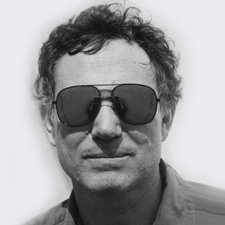Rob Bates interviews Joe for Boston Rock
Joe Frank - One-armed guitarists and other ‘Works in Progress’ : Rob Bates's interview of Joe for Boston Rock - sometime in 1990
Radio has been called “the theater of the mind.” It's unfortunate that most radio people don't have a mind like Joe Frank's.
It's hard to explain Joe Frank's weekly radio show, “Work in Progress” (Sundays on WBUR, 90.9 FM, from midnight to one), to those who have never heard it. It generally comprises a series of strange monologues and playlets, usually built around an equally strange theme. The moods range from darkly comic to bittersweet, and the total effect is confusing and fragmented, yet at the same time oddly compelling.
Frank himself appears in many of the shows, and he's an arresting presence. His gravelly, monotone voice reminds one of Jack Webb's, only it's soothing, almost hypnotic. He's best when he's reading one of his eloquent shrewdly conceived monologues, usually accompanied by the humming of a New Age tape loop. They are strange tales -- about a diabetic who tries to kill himself by eating a chocolate gun, or about a man who opens is diary, only to find that someone has proofread it. Weird imagery abounds -- “a one-armed man playing guitar,” for example.
Who is the man behind these bizarre creations? Well, in person (or on the phone, anyway), Joe Frank seems normal enough. A bit intense, maybe, and certainly very serious about his work.
“Work has become my singular obsession,” he says. “My life has become subjugated to my show. I really do little else but work. Lately, it's been kind of getting me down, because working all the times is not such a pleasant way to live.”
Frank says the disjointed structure of “Work in Progress” is a reflection of his view of the world.
“I don't believe in beginnings, middles and ends,” he explains. “Life is organic, and you keep on living to the end. Life isn't the way dramas are. You may find a solution to a problem, but that solution is really another problem.”
Frank is assisted on his shows by a talented repertory cast, which has included, at times, stand-up comedian Brother Theodore and “Amadeus” star F. Murray Abraham. Most of the dramatic scenes on the show are improvised by the actors, with Frank supplying only general direction for the. [sic]
“We want it to be real,” he says. “And we want the audience to think it's real. If you put a script in front of a bunch of actors, I don't believe in radio you can get really credible performances.”
Frank started in radio as a live radio host at New York's Free Speech station, WBAI, in charge of a midnight-to-five Friday night show called “In the Dark.” Frank would talk and complain about his life, do little dramatic bits and take calls from listeners. This being New York in the middle of the night, some of the listeners were a little out there. Frank's regular callers included a frequent “belcher” and a lady who would coo at Frank suggestively from her bath.
“In the Dark” was also known for its elaborate put-ons. One time, Frank presented an “obscure play” from a “great Rumanian playwright” and followed it up with a panel of experts discussing its symbolism. The whole thing was a hoax, but many listeners who called seemed to be taking it seriously.
A similar thing happened when Frank interviewed a mime on the radio, and let him perform (the result was, of course, silence.) Many irate listeners called in, berating Frank for doing something as stupid as putting a mime on the radio.
After WBAI, Frank had a brief stint as host of the weekend edition of NPR's “All Things Considered.” Frank says he got the job because “they liked my voice and they assumed I was smart.” In any case, it didn't work out. Frank had no training as a journalist and no interest in being one. “I would have these rambling interviews that would last a half-hour,” he recalls. “I would come back to NPR and no one knew how to edit it, and I didn't either.”
Frank was aiming for something more. “At NPR, you were just dealing with what happened that day,” he says. “There didn't seem to be any broader perspective of the human condition.”
Frank eventually left “All Things Considered,” jumping out of the way just as the axe was about to fall. By mutual agreement, it was decided he would spend the rest of his NPR contract doing free-lance radio dramas for “NPR Playhouse.” After that, Frank got a steady job doing weekly one-hour radio shows for LA's KCRW, under the umbrella title “Work in Progress.” NPR has since picked up the show and syndicated it.
Currently WIP is heard on more than 30 stations nationwide, mostly in cities in the North. NPR is having trouble getting the show on stations in the Mideast and in the South, mostly because of worries about the show's sexual content, which is actually pretty mild.
For the future, Frank says he's working on deals to bring his off-beat sensibility to film and television. He has done live readings of his monologues at LA's theaters, and William Morrow is planning to release a book of his stories.
As for the radio show, Frank says he's planning to take it in different directions, because of worries that he's repeating himself. His latest concept is “immersion radio.” His idea is to immerse himself in a subject for a week, and then go on the radio and talk about it. For example, one week will be “death immersion” week: Frank will spend a week reporting burials, wakes and funerals -- and then play the results for the listeners.
And so, it seems that Frank will continue on his often fascinating voyage through radio's outer limits. And he shows no sign of coming back down to earth.
